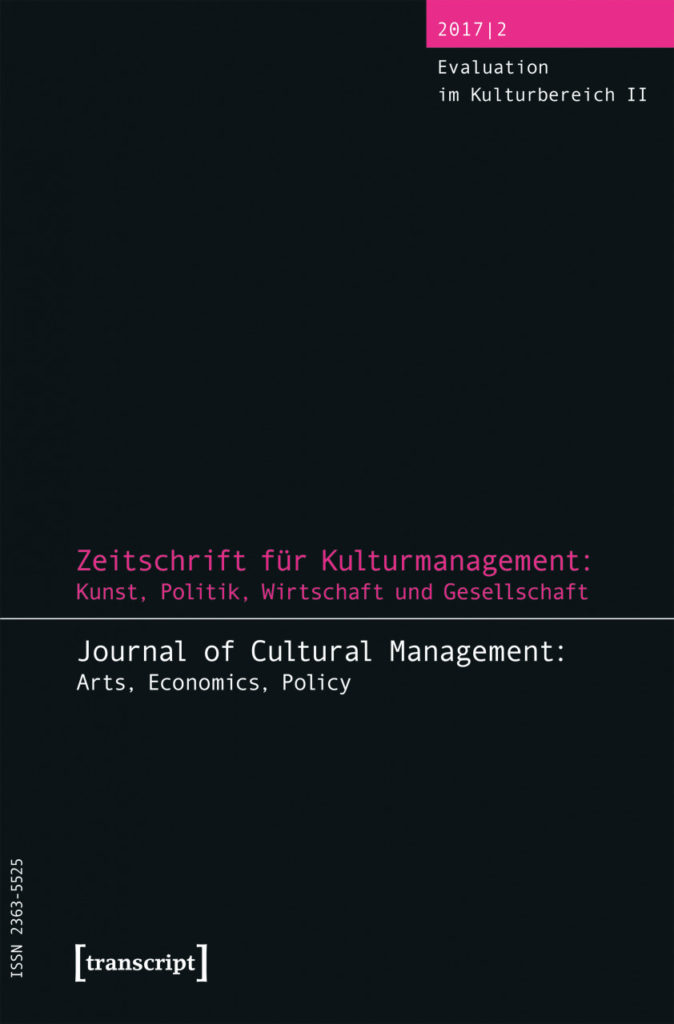Case Study
Mit interdisziplinären Veranstaltungsprogrammen neue und junge Besucher für Museen und Ausstellungshäuser gewinnen
Ergebnisse und Konsequenzen korrespondierender Evaluationen der Ausstellungen und gattungsübergreifenden Veranstaltungen im Hamburger Bucerius Kunst Forum
Abstract
This case study at the Bucerius Kunst Forum in Hamburg demonstrates how evaluating museums and exhibition facilities can be used as a strategic management and planning tool for exhibition and event programming.
An evaluation of the exhibition program in 2013 showed that younger (first-time) visitors, and visitors with little affinity to museums, were underrepresented at the exhibitions. Making changes to the exhibition program, a new corporate design, and increasing our activity on social media were used to change the demographic of the audience. A renewed evaluation of the exhibition program in 2016 examined the effects of these measures, and evaluated the exhibition forum’s extensive cross-genre event program.
The corresponding evaluation also examined which demographics in general were addressed by the interdisciplinary event programs and which event formats can be used to gain new and younger visitors. In addition, we focused on the role that partnerships can play in this context.
The results show that the make-up of the audience changed between 2013 and 2016: we improved our contact to our desired demographic. Evaluating the event program highlighted event formats and cooperation partners that provide direction in achieving these goals.
Keywords
2017 (2)
Evaluation im Kulturbereich II

Related Articles
Der Sonic Chair - ein neuer Weg zum anspruchsvollen Hörerlebnis
Yearbook for Culture Management 2012
Case Study
Digital Platforms as Facilitators of Dialogic Co-creation of Displaced Object Biographies
Journal of Cutural Management and Cultural Policy
Essay
Journal of Cultural Management 2015 (1)
Book Review
Wertesysteme von Kulturmanagern
Eine explorative TypologieYearbook for Culture Management 2010
Research Article
Journal of Cultural Management and Cultural Policy
Research Article
Journal of Cultural Management 2016 (1)
Research Article
© 2026, Journal of Cultural Management and Cultural Policy
Keywords
- Aesthetics
- Higher Education
- Cultural Diplomacy and Foreign Cultural Policy
- Occupation
- Career and Professional Role
- Audience Development
- Audience Studies and Visitor Studies
- Visitor Motivations
- Business
- Covid Pandemic
- Democracy
- Digitalization
- Diversity
- Third Sector
- Empirical Aesthetics
- Development
- Ethics
- Evaluation
- Field Theory
- Festival
- Film
- Federalism
- Community Arts
- Societal Change
- Ideology
- Staging
- Career
- Communication
- Concert
- Creative Industries
- Creativity
- Crisis
- Culture
- arts organizations, cultural organizations
- Cultural Participation
- Cultural Change
- Fincancing The Arts
- Cultural Promotion Law
- Cultural History
- Cultural Management
- Cultural Economy
- Cultural Organizations
- Art Education
- Cultural Policy
- Cultural Production
- Cultural Sociology
- Art Education
- Cultural Understanding
- Arts Administration
- Cultural Industry
- Cultural Sciences
- Art
- Art Field
- Arts Research
- Artists
- Artistic Research
- Artistic Reputation
- Arts Management
- Arts Organizations
- Art education
- Arts Marketing
- Arts Administration
- Curating
- Leadership
- Literature
- Advocacy
- Management
- Marketing
- Market
- Media
- Methods Development
- Mexico
- Monumentalizing
- Museum
- Music
- Non-Visitor Studies
- Opera
- Orchestra
- Organization
- Political Expression
- Post-truth Politics
- Professional Role
- Audience
- Audience Development
- Law
- Government
- Role
- Socially Engaged Art
- Social Cohesion
- Social Change
- Social Cohesion
- Non-visitor Socio-demographics
- Socioculture
- State
- Symbolic capital
- Dance
- Participatory Justice
- Theatre
- Theatre Governance
- Theory Development
- Tourism
- Transformation
- Survey
- Entrepreneurship
- Urbanism
- Civil Society


